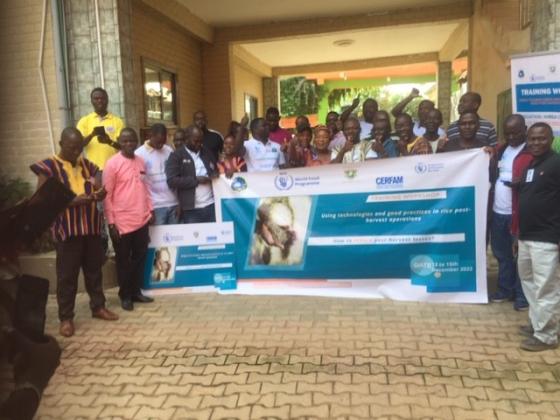Liberia: WFP, MOA Tackle Reduction in Post-harvest Losses

A three day workshop to educate 31 extension workers or technicians on how to deal with the issue of post-harvest losses in the agricultural sector of Liberia recently ended in Ganta, Nimba County.
The workshop was organized by the World Food Program (WFP) in collaboration with the Ministry of Agriculture.
Post-harvest losses are said to be one of the major problems affecting farmers in Liberia and even around Africa.
Some factors causing post-harvest losses, come from poor management practices, the lack of storage and processing facilities which lead to quality loss, quantity loss, nutritional loss and economic loss of the farming system.
During the training, the participants described the exercise as rewarding stating that post-harvest losses start from the beginning of farming to the time of harvest, and as far as the handling of seeding.
“You can do your best from the beginning. If you don’t have everything ready, there will be a great loss at last,” one of the facilitators, Elvis said.
Poor planning, quality of food as well as the safety, were among some of the causes that lead to post-harvest losses, because if you cultivated a large farm and there are no good storage facilities, there will be losses, Elvis said.
The workshop opened the understanding of the participants on so many issues relating to post-harvest which include the quality and safety of food leaving the farms transported to the market for consumption purposes.
The technicians of the Ministry of Agriculture have been urged to train farmers to put into practice the practices that would reduce post-harvest losses. But, the lack or limited shortage remained one of greatest challenges to the Ministry of Agriculture to properly monitor and guide farmers to overcome post-harvest losses.
Mr. Francis Woiwor, a technician from Lofa County, told the Daily Observer that he is supervising over 3,000 farmers in his assigned district, something he said was challenging.
“If the government could give loan to farmers like the former Agriculture Cooperative Development Bank was doing in the past, then the farmer will be capacitated to plan and put in place all mechanisms that will reduce post-harvest losses,” said Ms. Abibatu Toure, one of the agricultural extension workers from CARI.
Lonnie A. Herring, a consultant at MoA told the trainees in his closing remark, “we need to be more practical after this training and we also need more training to enhance our capacity.”
In a related development, WFP Liberia, in partnership with the Ministries of Education and Agriculture, has launched the home-grown school feeding (HGSF) program in Nimba County.
The program which seeks to prioritize the purchase of locally grow food from farmers for school feeding was launched alongside the post-harvest loss workshop.
WFP has carried our HGFF in Liberia since 2016 in Nimba County, but due to funding challenges the program was discontinued during certain period.
According to WFP, the program targeted 35,000 school children in 126 Public and Community Schools in four educational districts (Bain Garr, Zoe Geh, Saclepea I and Saclepea II) in the County.
The pilot project provided school meals consisting of Liberia’s staple food, rice, along with cowpea (bean) and other locally produced food commodities.
However, the project encountered quite a few challenges along the value chain and to identify the root causes of those challenges and look for opportunities to strengthen rice and cowpea supply chains.
At the End of July 2022, a report was shared with the Ministry of Agriculture, Education and other key technical and financial partners committed to the development of agriculture and education in Liberia.
The report identified post-harvest Losses among the key challenges affecting the revenues of smallholder farmers and the food security of vulnerable communities.
“To better understand the critical needs to improve post-harvest activities, it was necessary to conduct a further analysis through a complementary assessment on post-harvest activities,” said Mr. Fatal Adegbiyen of WFP.
From mid - end of October the assessment was led by HELPlogistics, supported on the field by World Food Programme and CERFAM /Regional Center of Excellence against Hunger and Malnutrition, in partnership with the Ministry of Agriculture in Liberia.
This exercise allowed to collect qualitative and quantitative outputs to appreciate the level of losses from harvest, transport, processing, storage, handling and distribution.
“In anticipation of the preliminary results from the post-Harvest lost report, CERFAM had continued to lead discussion with World Food Programme through the Division of Supply Chain Strategic Engagement, with the end goal to support rice value chain in Liberia,” the Deputy Director Adegboyen said.
Accordingly, one of the agreed-upon immediate activities that could be carried out to control losses is strengthening the capacity of farmers.
